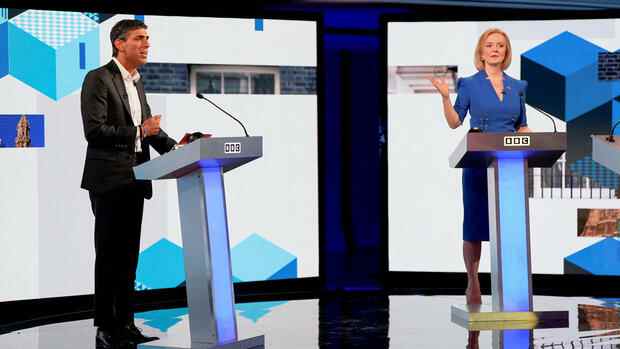London Liz Truss and Rishi Sunak exchanged blows in the first TV duel for the leadership of the Conservative Party in Great Britain. As expected, the hour-long debate in Stoke-on-Trent focused on tax cuts. While British Foreign Secretary Truss wants to reduce the tax burden by around £30 billion immediately, former Chancellor Sunak warns against increasing the national debt with tax cuts and fueling high inflation. Political commentators in London saw the telegenic Sunak as having slight advantages over the often stiff-looking Truss.
It only took a few minutes for the two conservative opponents to position themselves for the tax dispute: “I will relieve the burden on citizens immediately, withdraw the contribution increase for state social security and also temporarily suspend the price surcharge for the promotion of green energies,” announced Truss at the beginning. Sunak called his rival’s tax plans “irresponsible”. This will leave the following generations with a mountain of debt. “Solid finances are at the core of conservative politics,” said the 42-year-old.
The winner of the leadership battle will not only be the head of the ruling Tories, but also the successor to the resigned Prime Minister Boris Johnson. Around 160,000 party members, who can vote by post or online until September 5, have the final say. Opinion polls give the pro-Brexit and right-wing-backed Truss a clear lead over their grassroots rival.
So it was Sunak who went on the offensive from the start in the TV debate in front of 80 selected citizens. The former Treasury Secretary, who brought down Boris Johnson by resigning in June, not only denounced the additional debt Truss wants to take on for her tax plans. He also pointed out that tax cuts would push inflation higher, which rose to 9.4 percent in June, and could force the Bank of England to raise interest rates sharply. “Your own economic adviser calculates with key interest rates of seven percent,” Sunak reproached his party colleague and referred to statements by British economist Patrick Minford.
Top jobs of the day
Find the best jobs now and
be notified by email.
Truss countered that Sunack, as Chancellor of the Exchequer, pushed Britain’s tax burden to its highest level in 70 years. In view of the risk of recession, it was wrong to raise corporate tax from 19 to 25 percent, she said, referring to the ex-finance minister’s plans. “Higher corporate taxes are slowing down growth,” argued the Foreign Minister.
The people of the country are hoping for better political leadership.
(Photo: dpa)
In the tax dispute between the two candidates, two ideals of conservative economic policy collide: Truss relies on her party’s deep-rooted instinct for low taxes. Sunak appeals to the no less conservative aversion to doing business on credit. The fact that both candidates can refer to Tory idol Margaret Thatcher also makes the duel a battle for the soul of the Tories.
Far less controversial was the debate on other issues. Both candidates want to continue the harmonization of living conditions (“leveling up”) initiated by Johnson between the rich south of Great Britain and the poorer north of the country. While Truss is planning special economic zones with low tax rates in the northern regions, Sunak is focusing on tax incentives for private investments.
Both parties agree on Brexit
The two opponents also agreed that Britain would have to take a much tougher course against China. Former British Prime Minister David Cameron was still courting the Middle Kingdom until 2016, but the Tories are now outdoing themselves with harshness and distancing themselves from Beijing. Truss wants to take action against Chinese companies such as the video service TikTok, Sunak wants to stop Chinese investments if they threaten national security.
Both candidates also want to show toughness with Brexit. Sunak recalled with relish that his competitor had fought for Great Britain to remain in the EU. Truss tried to make up for this “blemish” by wanting to rid the UK of all the tight regulations from the EU era. The second TV duel between the two candidates will take place on August 4th.
More: Brexit dispute: EU Commission initiates four further proceedings against London
